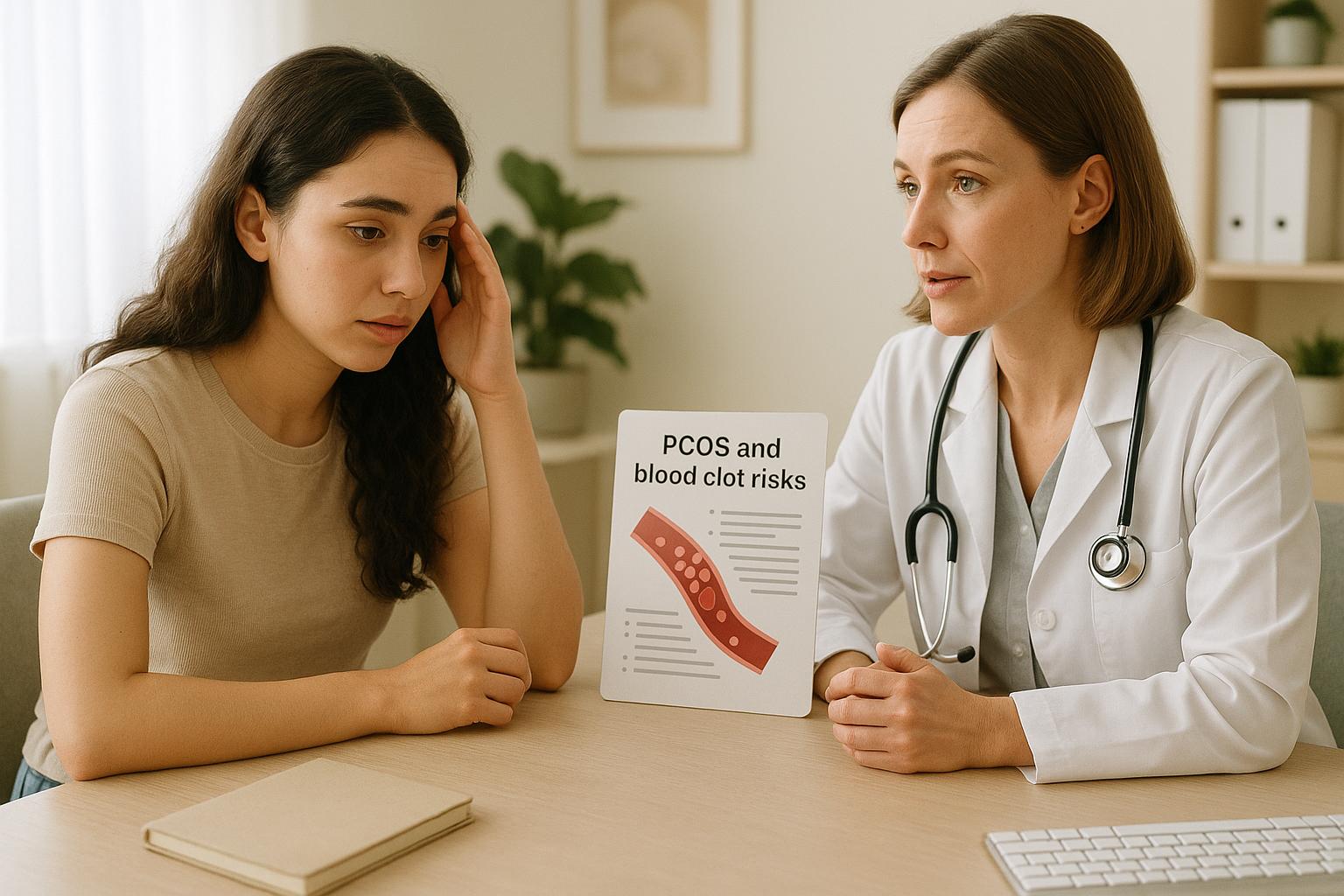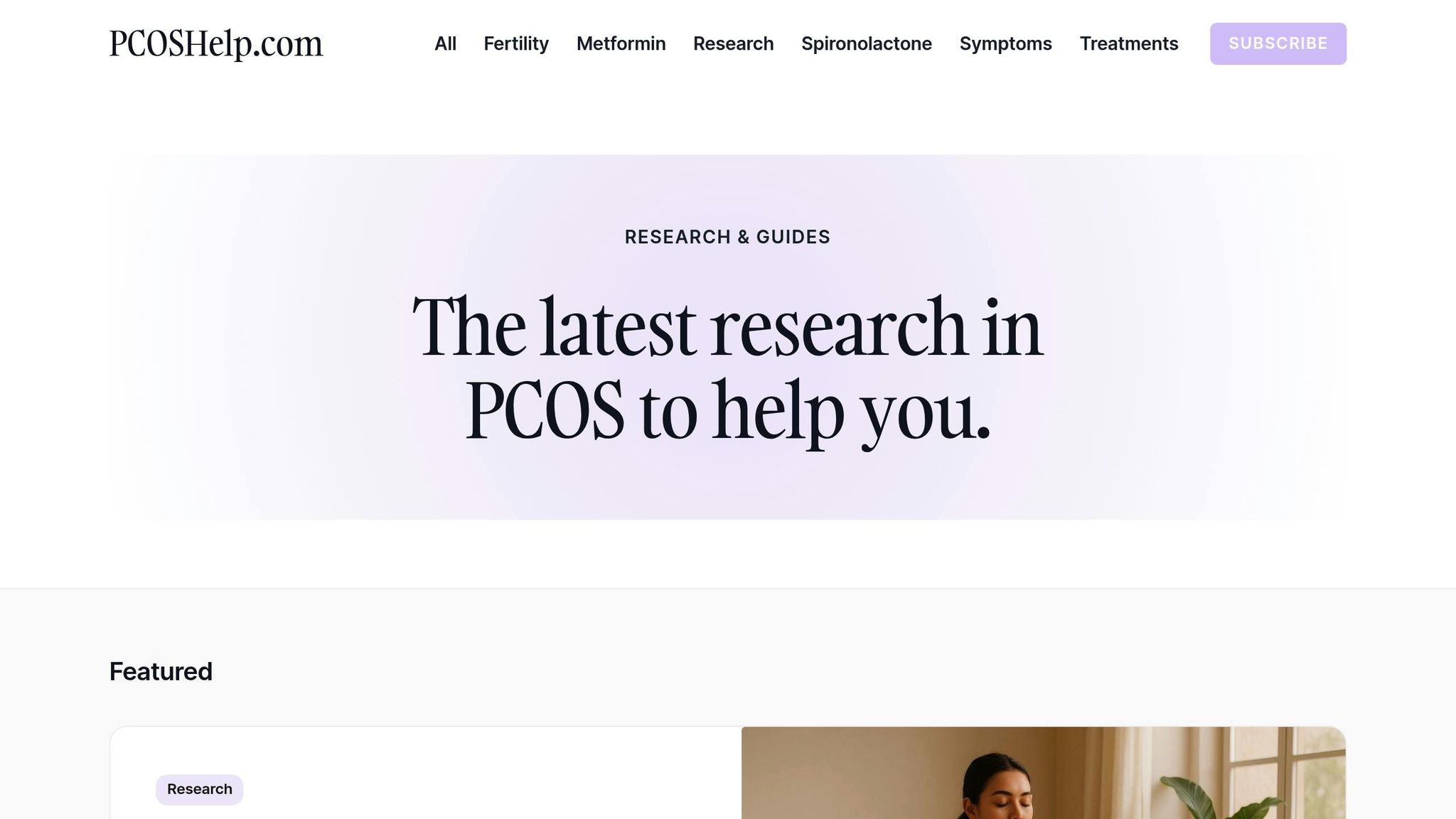Birth Control and Blood Clots in PCOS: Risks Explained
Explore how birth control affects blood clot risks in women with PCOS, along with safer contraceptive options and lifestyle factors.

Explore how birth control affects blood clot risks in women with PCOS, along with safer contraceptive options and lifestyle factors.

If you have Polycystic Ovary Syndrome (PCOS) and are considering birth control, it’s important to understand how hormonal contraceptives may increase your risk of blood clots. Women with PCOS already face challenges like insulin resistance, inflammation, and higher cardiovascular risks. Adding estrogen-containing birth control can amplify these risks, potentially leading to complications like deep vein thrombosis or stroke. However, safer options, like progestin-only methods or non-hormonal IUDs, are available.
Understanding your unique health profile and working closely with a healthcare provider can help you make informed decisions about managing PCOS symptoms while minimizing risks.
Polycystic Ovary Syndrome (PCOS) is a hormonal condition where the body produces higher levels of androgens (male hormones) and often struggles with insulin resistance. While ovarian cysts are a common feature, not every individual with PCOS has them. Symptoms typically include irregular menstrual cycles, excessive hair growth (hirsutism), acne, and difficulties with weight management. These hormonal shifts can disrupt metabolism, setting the stage for issues that increase risks to cardiovascular health.
PCOS doesn’t just affect reproductive health - it also impacts the heart and metabolism, significantly raising the risk of blood clots. Insulin resistance, a hallmark of PCOS, leads to elevated insulin levels in the bloodstream. This, in turn, causes inflammation in blood vessels and damages their walls, making them more prone to clots. High blood pressure, another common issue, further stresses the vessels and harms their delicate linings, increasing clotting risks.
Excess abdominal fat, often seen in PCOS, contributes to chronic inflammation, which negatively affects blood circulation and vascular health. On top of that, imbalances in cholesterol levels - such as reduced "good" HDL and increased "bad" LDL - can lead to plaque buildup in arteries. If these plaques rupture, they can spark clot formation. Research also suggests that PCOS may directly influence blood clotting factors, making clots more likely to form.
The interplay of chronic inflammation, hormonal imbalances, and metabolic disturbances creates a perfect storm for clot development in PCOS. This makes it especially important to understand these risks, particularly when considering birth control options, as they can further influence clotting tendencies in those with PCOS.
Hormonal birth control, especially combined oral contraceptives containing both estrogen and progestin, can influence the body’s natural clotting processes. Estrogen plays a key role here, increasing the production of clotting factors like fibrinogen and prothrombin in the liver - both critical for forming clots. At the same time, it can lower levels of natural anticoagulants like protein S and antithrombin, tipping the scales toward a higher likelihood of clot formation. This increased risk is particularly noticeable during the first few months of use. For individuals with PCOS, this clotting imbalance can become even more pronounced.
Studies indicate that hormonal birth control can further elevate clotting risks in women with PCOS. The condition itself often comes with metabolic challenges, such as insulin resistance and inflammation, which can amplify the clot-promoting effects of these contraceptives. Research highlights a higher likelihood of venous thromboembolism (VTE) in women with PCOS, particularly when obesity is also a factor. This combination creates a compounded risk that requires careful consideration.
The type and formulation of birth control significantly impact clotting risks. Older contraceptives with higher estrogen doses carried greater risks, while modern low-dose pills have reduced - though not eliminated - these concerns. Beyond estrogen levels, the type of progestin matters too. For example, formulations with drospirenone may carry a higher risk compared to those with levonorgestrel.
Non-oral contraceptives also vary in their effects on clotting. The contraceptive patch, for instance, may expose users to different estrogen levels compared to pills, while the vaginal ring provides a steady hormone dose with a risk profile similar to combined oral contraceptives. In contrast, progestin-only options like injectable contraceptives avoid estrogen entirely, potentially offering a safer alternative for those at higher risk.
The timing of use also plays a role. The first few months after starting hormonal birth control are often the riskiest, as the body adjusts to the hormonal changes. While the risk may stabilize over time, it remains higher than in those not using these methods. For individuals with PCOS, understanding these nuances is critical for making informed decisions about safer contraceptive options.
When it comes to blood clot risk, PCOS and hormonal birth control are just part of the story. Several other factors can contribute to your overall risk. Understanding these can help you better assess your situation and make informed health decisions.
Certain lifestyle choices and health conditions can significantly impact your blood clot risk, especially when combined with PCOS and hormonal influences.
Your age and natural hormonal shifts also play a role in modifying blood clot risk. These factors can amplify the risks associated with PCOS and hormonal contraceptives.
It’s essential to remember that your clotting risk isn’t static - it evolves with age, lifestyle, and health conditions. What might be considered a low risk in your 20s could change significantly as you get older or as new factors, like weight gain or high blood pressure, come into play. Regular check-ins with your healthcare provider can help you stay on top of these changes and make the best choices for managing PCOS and your overall health.
Women with PCOS face unique challenges when it comes to choosing birth control due to an increased risk of blood clots. To address these concerns, healthcare providers focus on personalized risk assessments, careful contraceptive selection, and ongoing monitoring to ensure both safety and effective symptom management.
Before recommending hormonal birth control, healthcare providers conduct a thorough risk assessment. This evaluation goes beyond a PCOS diagnosis, weighing the benefits of hormonal contraception against potential clotting risks for each individual.
The assessment typically includes:
While routine clotting tests aren’t standard, targeted blood tests may be ordered if significant risk factors are present. These tests can help identify inherited clotting disorders that could elevate the risk of complications. Regular follow-ups, especially in the first few months of starting a new birth control method, are crucial. Over time, as health and lifestyle factors change, periodic reassessments ensure that the chosen contraceptive method continues to be safe and effective.
For women with PCOS who are at higher risk of blood clots, there are several safer contraceptive alternatives:

Navigating birth control decisions with PCOS requires reliable, evidence-based information. That’s where PCOSHelp comes in. By offering clinically backed resources and the latest research, PCOSHelp empowers women to make informed choices about their health.
Through detailed guides on contraceptive options, symptom management, and lifestyle strategies, PCOSHelp provides practical insights. For example, it covers medications like metformin and spironolactone, which are often used alongside - or as alternatives to - hormonal contraceptives.
By staying up-to-date on advancements in PCOS treatment and contraceptive safety, PCOSHelp equips women to have more meaningful discussions with their healthcare providers. This combination of personalized medical advice and trusted resources ensures women can make decisions that align with their health goals and risk considerations.
With this integrated approach, women with PCOS can confidently choose birth control options that support both their safety and overall well-being.
Choosing the right birth control as a woman with PCOS can feel overwhelming, especially with the added concern of elevated blood clot risks. But with accurate information and proper guidance, safe and effective options are within reach. Research shows that estrogen-containing birth control increases blood clot risks for women with PCOS, but there are alternatives that prioritize both safety and symptom management.
The key is understanding these risks and exploring solutions tailored to your unique needs. Options like progestin-only methods, non-hormonal IUDs, or even treatments like metformin can address contraception and PCOS symptoms simultaneously. Personalized care makes all the difference.
When you're well-informed, you're better equipped to make decisions that improve your health. Knowing how PCOS impacts cardiovascular health, why certain contraceptives carry higher risks, and what safer alternatives exist can help you have more meaningful discussions with your healthcare provider.
Platforms like PCOSHelp aim to simplify these complex topics, bridging the gap between medical research and practical decision-making. From clinically supported advice on medications and symptom management to insights on fertility, stress, and diet, PCOSHelp provides a well-rounded approach to managing PCOS. This blend of expert guidance and accessible resources ensures you're supported every step of the way.
Women with PCOS face a higher risk of blood clots (venous thromboembolism or VTE) when using birth control containing estrogen compared to women without the condition. Research indicates their risk is roughly double, with about 23.7 cases per 10,000 person-years, compared to 10.9 cases per 10,000 among other users of oral contraceptives.
This elevated risk stems from the hormonal and metabolic changes associated with PCOS, which can make individuals more prone to clotting. Although birth control is a widely used option for managing PCOS symptoms, it’s crucial for women with PCOS to talk with their healthcare provider to evaluate their specific risk factors before starting estrogen-based contraceptives.
Yes, adopting specific lifestyle changes can play a role in lowering the risk of blood clots for women with PCOS who are on birth control. Engaging in regular physical activity, keeping a healthy weight, and sticking to a balanced diet can improve insulin sensitivity and reduce body mass index (BMI) - two key factors tied to clotting risks.
These steps not only promote better overall health but also tackle some of the root issues linked to PCOS that might increase the likelihood of blood clots. Be sure to consult your healthcare provider to create a plan that works best for your individual needs.
For women with PCOS who are worried about blood clot risks, choosing the right birth control is crucial. Progestin-only options - like the Mirena IUD, Depo-Provera, or Provera - are often considered safer in this regard, as they generally carry a lower risk of blood clots compared to combined hormonal contraceptives that include both estrogen and progestin. Combined contraceptives, on the other hand, can significantly raise the risk of venous thromboembolism (VTE), sometimes doubling or even tripling the chance of developing clots.
If combined contraceptives are necessary, those containing second-generation progestins such as levonorgestrel are typically a better choice, as third-generation progestins are associated with a slightly higher risk of clotting. Personal health factors like age, weight, and family history of clotting disorders also play a key role in determining the safest option. Always consult with a healthcare provider to weigh these factors and find the best solution tailored to your individual needs.